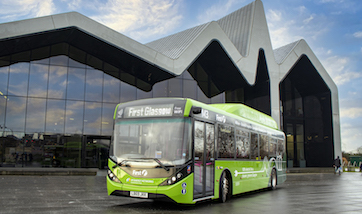Aberdeen-headquartered transport giant FirstGroup plc said recent First Bus passenger volumes have increased to 83% of 2020 equivalent levels, with commercial and concessionary volumes at 87% and 75% respectively.
In a trading update, FirstGroup said the increase in demand “has partially resulted from the £2 bus fare cap scheme introduced in England … and the Scottish Government’s funding for free bus travel for all under-22s that has been in place since January 2022.”
FirstGroup said it anticipates “that the FY 2023 group adjusted operating profit and group adjusted attributable profit will be ahead of the group’s previous expectations.”
FirstGroup added: “The Group’s expectations for FY 2024 remain unchanged.”
The firm said First Bus has also benefited from improved driver resources in certain locations, with increased recruitment largely due to a number of initiatives introduced across the business.
“In addition, we welcomed the Government’s extension of the Bus Recovery Grant in February 2023, which will help protect vital services for passengers for a further three months,” said FirstGroup.
“We continue to work with our government and industry partners on long-term funding arrangements for the sector.”
On First Rail, FirstGroup said: “Our open access operations Lumo and Hull Trains, which are the only segment of the First Rail division where the group takes full passenger revenue risk, have experienced stronger than anticipated passenger demand throughout H2 2023.
“The First Rail division has also benefited from the settlement of one-off claims relating to prior reporting periods.”
FirstGroup CEO Graham Sutherland said: “I am pleased by the group’s progress in the second half of our 2023 financial year, which has been driven by increased passenger volumes and improved operational performance in bus and stronger than anticipated demand for our open access operations in rail.
“We remain committed to working closely with our partners to deliver successful bus and rail networks that serve the needs of our customers and communities and to playing a central role in achieving many of society’s economic, social and environmental aims.”
